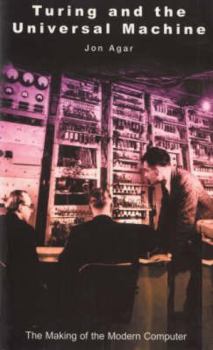Turing and the Universal Computer
(Part of the Revolutions in Science Series and Icon Science Series)
Select Format
Select Condition 
Book Overview
The history of the computer is entwinedwith that of the modern world and with the life of one man, the brilliant buttroubled Alan Turing. How did the computer come to structureand dominate our lives... This description may be from another edition of this product.
Format:Paperback
Language:English
ISBN:1840462507
ISBN13:9781840462500
Release Date:April 2001
Publisher:Icon Books UK
Length:155 Pages
Weight:0.35 lbs.
Dimensions:0.6" x 4.4" x 6.9"
Customer Reviews
5 ratings
Excellent read for at least some, hopefully all
Published by Thriftbooks.com User , 16 years ago
I picked this book up randomly at the library between classes. I only got about half way through before I had to leave but I made sure to tuck it away and finish it later that night. Excellent read for one sitting. Even if the author doesn't accurately present the true intentions and motivations behind Babbage and Turing's breakthroughs, he still manages to establish that computer science was an evolution of thought not some spontaneous stroke of brilliance. By the end of the book you feel a little starved for information but that is what makes this book such an excellent primer for additional reading on a number of subjects. This book really is a primer, don't read it if you have PHDs in history and computer science. I don't want to see Dr. whats his face giving this book half a star. It's a good book period.
Profound Ideas
Published by Thriftbooks.com User , 18 years ago
This brief "history" is more of a thought-provoking analysis of the idea of computing than a recital of the crucial events leading to what we currently think of as a modern computer. Though it does provide some fascinating historical tidbits not found elsewhere, the power of this work lies in its discussion of the underlying theory of computing. For example, Mr. Agar's initial take on Babbage, i.e. that in designing the analytical engine he was merely recreating a manufacturing center, with which he was intimately familiar, is just the first of many profound observations that seem to be tossed off without further comment. Portraying Bletchley Park as a computer itself with the various huts being distributed processors was also a sound analogy and would be a tremendously effective segue into a story about the Internet. The story of Mr. Zuse's machine is likewise a fine example of Mr. Agar's thesis that the increase in computing power merely reflects the increasing complexity of our world. He raises a brilliantly multi-faceted what came first--chicken or egg--argument. Did complexity give birth to the computer or vice-versa? However, I think his ideas go well beyond that premise--though the comments on modern bureaucracy and corporate management were rather cryptic, isn't it true that in the world of "google" we are all distributed processors in a gigantic Universal Machine? I am surprised that the author didn't fully develop the swiss knife analogy with which he began the book. In a real sense any stand-alone computer is a special purpose machine because it is limited by its user. It is only when programming is universally understood or, better yet, a transparent part of using the machine that we have a truly universal machine. And that is developing right under our noses--the internet has in just a few short years completely changed the educational experience (given the power of the internet my kids have never had to worry about not being able to find the right books in the local library), it has dramatically changed the marketplace (the most obscure books or materials are but a click away), it continues to redefine modern media (Drudge?) and to churn out innovation. But is the latest step towards a truly universal machine--the Internet--the result of society's changes or the cause? We are blind to the significance of the computer because we are surrounded by its effects. Something huge is coming--the machine envisioned by Turing is still being developed--will we be ready for it, will we be able to understand its power, will we even recognize it when it arrives?
A good primer for the topic at hand
Published by Thriftbooks.com User , 19 years ago
I was really hoping for a more detailed time line of the events leading upto the ENIGMA and what eventually lead to the first commercial computers during the late 50s and mid 60s. The author spent a great deal of time detailing the mathematical advances and controversies that spurred the technological advances we see today. Overall the book was mildly interesting, but probably not for the average reader. On the other end of the spectrum it was too much of a primer for anyone with some historical knowledge of mathematics and its part in developing computers.
The Making of the Modern Computer
Published by Thriftbooks.com User , 21 years ago
I would rather term this book as The Making of Modern Computer rather than Turing and the Universal Machine. It covers whole lot of stories right from the analog machine to modern computer. I expected lot about how Turing and how he made the Universal computer. It is worth reading about the whole history of computer. Very less information about Turing and his work.
book review
Published by Thriftbooks.com User , 23 years ago
I read this book cover to cover on the train from Manchester to London. I really liked the accessible style of the book, leading you into discussion of a complex story and some of the theory behind the personal stories, without trying to obscure or gloss over the facts. I would recommend it to anyone who wants to quickly get a good grounding in the history of the computer.






